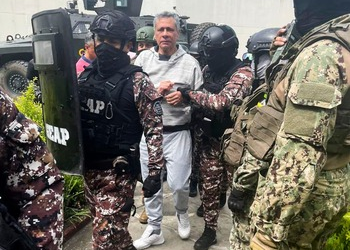The raid by Ecuadorian security forces on the Mexican embassy in Quito to arrest former Vice President Jorge Glas not only shattered diplomatic conventions, it could also put international and domestic support for the government’s security agenda at risk.
Late in the night of April 5, heavily armed Ecuadorian security officials stormed the embassy building, where Glas had claimed asylum after arguing that his prosecution on corruption charges amounted to political persecution.
Glas was then held in the La Roca maximum security prison, but three days later, he was taken to the emergency room at a nearby hospital. Prison authorities put out a statement claiming Glas had taken ill after refusing food, although police reports cited in local and international media suggested he may have overdosed on medications.
Glas has been twice convicted on corruption charges, but was released early from prison in November 2022 in a controversial ruling by a judge who has since been detained as part of a bribery investigation.
SEE ALSO: GameChangers 2023: Ecuador Loses Its Grip on Crime
When a new investigation was launched into fresh corruption charges, he sought asylum from Mexico, and had been sheltering in the embassy since December 2023. Just hours before the raid, the Mexican government announced it had granted Glas asylum and requested his safe passage out of the country.
Following the operation, Mexico immediately severed all diplomatic ties with Ecuador, with President Andrés Manuel López Obrador putting out a statement on social media condemning “the flagrant violation of international law and the sovereignty of Mexico.”
Governments and international bodies from across the region and beyond also denounced the raid.
Ecuadorian President Daniel Noboa defended the raid in a statement published April 8, saying the operation was meant to protect national security.
“We couldn’t allow asylum to be given to convicted criminals involved in very serious crimes,” he said.
InSight Crime Analysis
The decision to launch the raid on the Mexican embassy has the hallmarks of a political gamble, with Noboa betting that the benefits of burnishing his hardline reputation outweigh the risks from the potential fallout. However, this gamble has the potential to backfire in ways that could undermine his anti-crime and corruption policies at home and alienate key security partners abroad.
Noboa came to power in November 2023 after an unexpected victory in a special election called when previous President Guillermo Lasso stepped down midterm. Since then, he has cultivated a strongman image of a leader willing to take an all means necessary approach to tackling the crime and corruption that has plunged Ecuador into crisis. His rhetoric has been backed by a hardline military crackdown on gangs and a sweeping anti-corruption investigation targeting high level public officials.
This approach has generated high approval levels among an Ecuadorian population alarmed by violence and instability. However, with crime rates creeping back up and growing signs that the gangs are far from defeated, that support has been wavering slightly, according to recent polling.
Noboa is now facing a critical test of his popular backing in the form of an April referendum toughening prison sentences and enshrining the use of the military for domestic security into law, and he may be hoping this operation shores up his support ahead of the vote.
SEE ALSO: Thriving in the Shadows: Cocaine, Crime, and Corruption in Ecuador
However, any popularity gained among voters will likely be offset by a loss of elite political support. So far, Noboa has been able to implement his security policies thanks to the support of a coalition of opposition parties — the most important of which is represented by Glas. There is now a risk these parties will withdraw this support and instead work to sabotage his security agenda.
Implementing his security agenda will now require Noboa to build a new political coalition, according to Lorena Yael Piedra, president of the Ecuadorian Association of International Studies.
“There are possibilities for him to generate a new majority in the Assembly, but he is going to have to work hard to reinvent himself,” she told InSight Crime.
On the international front, Ecuador’s most important security partners and allies seem likely to take no action beyond their initial public statements condemning the action.
For some counties, the cost of isolating Ecuador over the raid may be too high for their outrage to last. This is especially the case for the United States, which needs to keep close ties with Ecuador to administer a multimillion-dollar security aid package, which was announced amid a spike in the numbers of Ecuadorian migrants seeking refuge from the violence and instability at home.
Others, though, may not be so willing to let the case die down so easily. Of particular concern will be Colombia, the source country for the cocaine trafficked through Ecuador. The Colombian government reacted to the operation by filing a suit with the Inter-American Commission on Human Rights demanding it take action to protect Glas. A breakdown of information sharing and security ties with Colombia could severely hinder Ecuador’s ability to monitor cocaine flows and combat the criminal networks working in both countries.
The most severe rupture will almost certainly be with Mexico, and this could have severe repercussions for security cooperation. Mexican drug trafficking organizations are among the main buyers of the cocaine trafficked through Ecuador and contractors of the Ecuadorian criminal groups that move it through the country — the same groups that are among the principal drivers of domestic insecurity.
However, according to Piedra, mutual security interests may trump political antagonism.
“The risk [of a breakdown in cooperation] is there but I would think that the actors involved are going to be sufficiently strategic not to shut down these paths,” she said.
Featured image: Ecuadorian security forces escort former Vice President Jorge Glas to maximum security prison. Credit: Alina Manrique, El País

